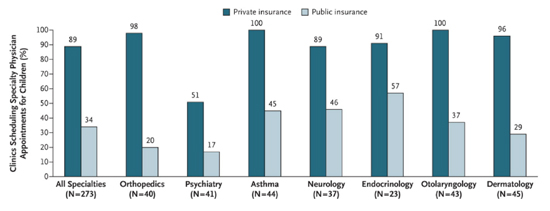Children on Medicaid: Less Access, Longer Waits
Sixty-six percent of those who mentioned Medicaid-CHIP (Children’s Health Insurance Program) were denied appointments, compared with 11 percent who said they had private insurance, according to an article being published Thursday in The New England Journal of Medicine.
In 89 clinics that accepted both kinds of patients, the waiting time for callers who said they had Medicaid was an average of 22 days longer.
Full NYT article on children on Medicaid. See commentary by Megan McArdle, Avik Roy and Austin Frakt.



This is one of those research projects where a study is stating the obvious to the extent you wonder why the authors even felt the need to conduct a study. But this study is important to the health reform debate by quantifying (again) how difficult it is for Medicaid enrollees to access care. Half of the newly insured under the Affordable Care Act will be covered by Medicaid.
A previous study looked at Medicaid enrollees’ access to primary care physicians. That study found the uninsured had an easier time getting an appointment with a primary care physician that someone on Medicaid.
In a lecture earlier this week at the Heritage Foundation, Senator Hatch spoke about reforming Medicaid calling the current system a target for “waste, fraud and abuse”. A single centralized system for an entire country full of diverse states with spceific needs is clearly not working. Medicaid is not serving its own purpose and the 66% is a prime example of how the current system is screaming for reform.
Remember, this is what the left considers universal coverage. If we ever got single payer health insurance, we would all be in Medicaid.
Remember, a lot of the kids on SCHIP lost their private insurance in the process. They went from having full access to care to limited access to care.
The left doesn’t believe in universal access to care. They believe in collectivized rationing of care.